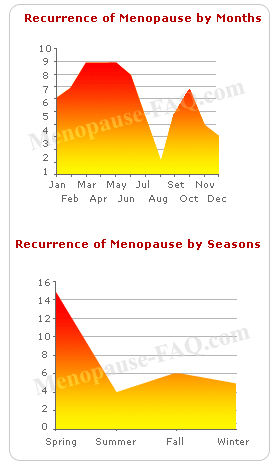 |
 |
|
|
| |
|
| |
|
 |
|
 |
|
 |
|
 |
|
| |
|
| |
|
| |
|
 |
|
 |
|
Links between Menopause and the Seasons of the Year? |
|
|
|
It is widely known that seasonal variations affects the functions in wild animals, and similar but not so definite seasonal trends have been described for humans. In fact, a recent research performed by Hungarian experts may confirm this appreciation.
Dr. Janos Garai, from Baranya County Teaching Hospital in P�cs, Hungary, is the lead author of a study which attempted to find out if seasonal changes could impact the timing of menopause. They consider that menopause is a complex set of symptoms that is determined partly by external and partly by internal influences. Also, there are only scarce data about the exact nature of environmental and/or lifestyle determinants. |
 |
The Hungarian investigation suggests there is a definitive link to the onset of menopausal symptoms and the seasons. The study was based on a survey that questioned 102 women on recalling the exact month of menopausal onset (discontinuation of their periods, in their words, their last menstrual cycle).
Among all these women, 72 remembered the exact month that their menopausal periods stopped, while only 30 could recall only the season. The study also considered various diet and exercise questions included in the questionnaire, but the seasons appeared to be the most influential cause leading to menopause. The results revealed that spring and autumn equinoxes are evidently related to the timing of menopause. The recurrence of menopause start can be seen on the chart on the left. Dr. Garai and his fellow Hungarian fertility experts published their study in the journal �Human Reproduction�, which is the leading reproductive medicine publication in Europe. They found that the spring and autumn seasons played an important role in when women experience menopause. "We found that there was a high peak after the spring equinox and another, lower one, after the autumn equinox," said Dr. Janos Garai. |
|
The authors of the report say that the triggering factors and the mediators involved need further research. However, melatonin, a hormone secreted by the pituitary gland, which is generally accepted to play a role in the circadian rhythm (the 24 hour time clock that governs different physiological processes), could be involved. Melatonin binding is found in the ovaries and it also influences ovarian steroid hormone production. Other research has shown that the harmony of these links becomes disrupted in parallel with a fall in melatonin levels in early peri-menopause. Because of the imbalance of these hormonal factors in pre-menopause, the process eventually culminates in a point where it stumbles into irrecoverable ovarian failure. Length of day is likely to be only one of several factors operating and melatonin might not be the only agent involved so we need to research this further. So they wanted to find out more in the hope that this might help in the future in implementing innovative approaches to treating problems in the menopause.
Source: Garai Janos, et al. �Short communication: Seasonal onset of menopause?� Human Reproduction, v19 (July 2004)
|
|
|
| ©Copyright 2008. Menopause Stages. All rights reserved. |
| Providing information on: Menopause Stages, Premenopause, Perimenopause, Menopause, Postmenopause. |